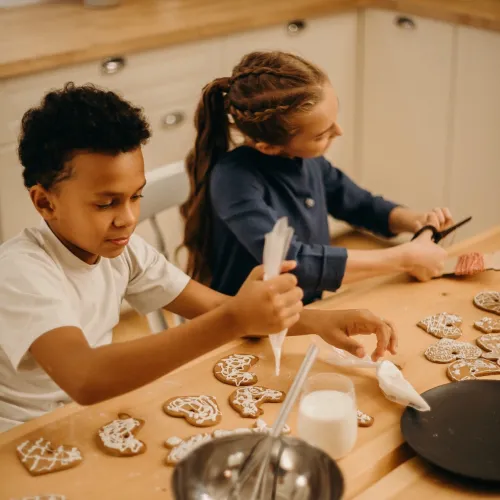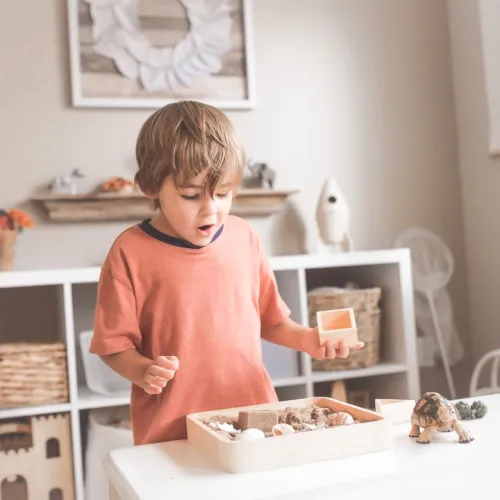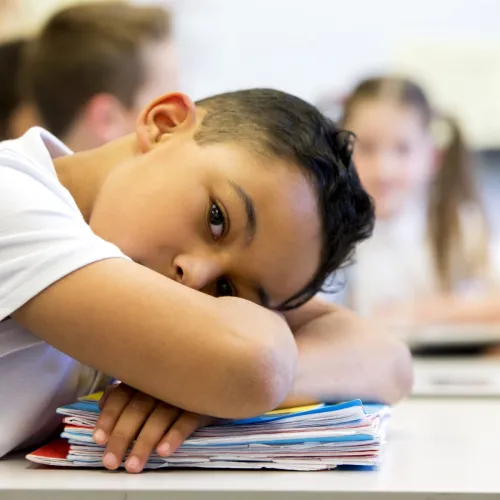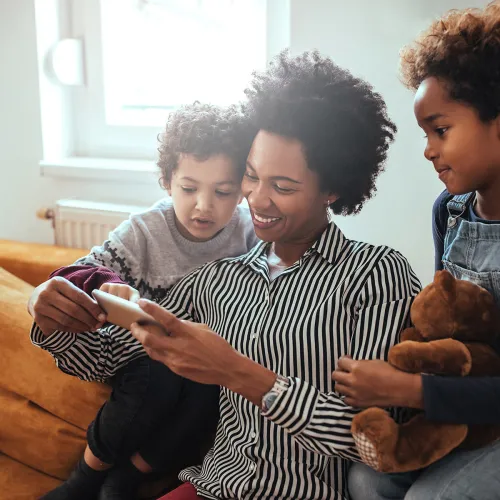Parenting Mistakes After Divorce
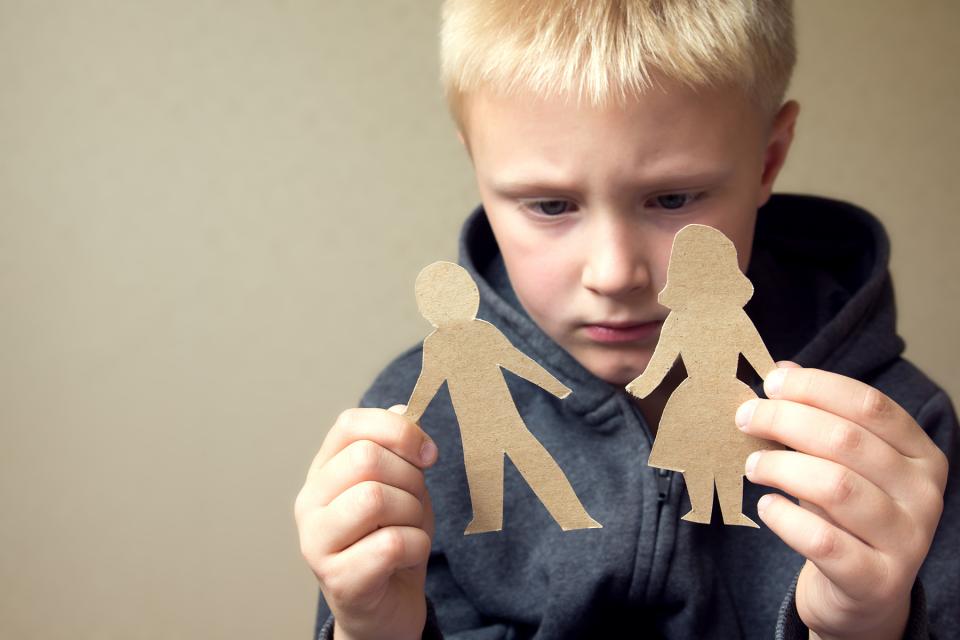
After a divorce, it isn’t always obvious how co-parents should move forward with parenting solo. Of course, looking at the big picture: you’ll still be raising your children together. But suddenly being the only adult on duty can be a little disorienting.
Raising your children in the same manner as you were before won't likely be an option. As you adjust to all the necessary changes, parenting mistakes after divorce are bound to happen. However, this doesn't mean you and your co-parent can't still be positive forces in your children's lives.
Part of managing the act of parenting after divorce is being able to recognise common mistakes and missteps. Once you know these four common mistakes, you’ll be able to spot them if they ever begin to creep into your parenting, giving you ample time to employ strategies to prevent them from becoming major issues.
Arguing over trivial items
When children grow up in two homes, items will inevitably get lost in the shuffle. But when you realise that one of your children forgot to pack their favourite pair of pyjamas, for instance, you must resist the urge to message your co-parent with unhelpful critiques or requests for additional drop-offs of the forgotten items.
The simplest way to prevent you and your co-parent from butting heads over forgotten items is to get rid of the whole ‘pack a bag’ routine entirely. For starters, having children pack up and “move” every time they transfer from one of their homes to the other can make them feel like guests in both. Your children will already be dealing with so many changes, and packing a bag every time they go between houses will only further prevent them from settling into their new family structure comfortably.
To get rid of the routine entirely, both you and your co-parent will need a set of the essentials at each of your homes. That means always having clothes, toiletries and a few toys on hand. You won’t be able to duplicate the super special items, so your child may still want to carry their favourite stuffed animal regardless of the ‘no packed bags’ arrangement. But knowing that both of you have the essentials greatly minimises the chances of arguments over left-behind items.
What about non-trivial items, like medicine or sports equipment? Parents need to be on top of their game when it comes to things that cannot be duplicated. For medicine that can be divided, consider using a container to divvy up medication based on the number of doses that will be administered in each home. You can do this once and never have to worry about packing the medicine with each exchange.
For items that must make the trek back and forth, use a checklist every single time. Print it and keep it by the front door. Have an extra sitting on your passenger side seat. Take a picture of it and put it as the lock screen of your phone. Basically, put it in a place where you’ll be forced to look at it before you’re halfway to your co-parent’s place. And if you still forget? Be prepared for frustration from your co-parent, apologise, and simply do better next time.
Overindulging your children
A divorce is a traumatising event for children to go through, and it often leaves parents feeling guilty. As a way to try and make things right, some parents may overindulge their children a bit. This might be done by buying them lots of gifts, treating them to extra desserts throughout the day, or simply letting them get their way whenever they want it.
While it isn't wrong to sometimes indulge your children's desires, it can turn into an issue if it is done too often. As time goes on, your children may have grown to expect this sort of treatment, and this can lead them to have unrealistic expectations of you and of life in general. They may begin to act out in anger or frustration when you or others do not let them get their way. This kind of behaviour is unhealthy and has the potential to lead to consequences in school, with friends, and in other areas of life.
Although it might feel good to make your children happy in the moment, you're not doing them any favours in the long run by overindulging them now. Love and respect are things that are earned, not bought. Don't allow yourself to break the rules you had once set out in parenting, as this will just confuse your children in the end.
Badmouthing your co-parent
Even if you think that you never say bad things about your co-parent in front of your children, you might be saying more than you should sometimes. Badmouthing your co-parent can have its consequences, even if you think you're being "careful" about how you're doing it.
Children can easily hear phone conversations you're having with a friend, look through your text messages, and understand sarcasm in your voice as you say something backhanded about your co-parent. For children, hearing their parents badmouth each other is an emotional burden. They don't want to hear one of their parents saying mean things about the other. They might even feel like you're trying to convince them to feel the same way, and that is completely unfair.
As co-parents, badmouthing each other is an easy mistake to make after divorce. But no matter how frustrated you are, it can only make things worse. Take time to think before you start talking about anything that includes your co-parent. Talking about your feelings with a counsellor or therapist can be so helpful for working through your feelings in an appropriate setting.
Other adults who are close to your children will also have an influence on their emotions. If your friends or family are the ones who are badmouthing your co-parent in front of you or your children, tell them to stop. Let your children have the opportunity to feel how they want to about both of their parents without any outside influences.
Making your child choose
After a divorce, some parents want to leave it up to their children to decide who they want to live with and when. They might think they are doing their children a favour by letting them make the decision rather than having everything decided for them.
While getting an opinion on the matter from your older children isn’t a bad idea, children should not be faced with making this decision on their own. They might not know what to do or which way to go, as they don't want to hurt either of their parents by picking one over the other. It can also leave parents feeling hurt, believing that their children love one parent more than the other simply because their children stated that they'd like to live primarily with the other parent.
Particularly for young children, having to make the choice between one parent or the other is not a fair task for them to be subjected to. Children crave to have a relationship with both of their parents, and they don't want to hurt anyone's feelings. Dedicate yourself to working with your co-parent on a living solution that best fits your family's lifestyle overall. Working together to create your parenting agreement will leave both of you much more satisfied with the results because you'll have more control over the outcome. Explain your decision to your children, and assure them that no matter where they are, they can reach out to both of you anytime.
The truth about mistakes is that everyone makes them, especially when adjusting to a huge life event like divorce. Even so, these parenting mistakes are all fixable. And if you are working proactively to counteract them, some of them are avoidable entirely.
As co-parents, it’s easy to focus on the here and now—but it’s so important to think through the long-lasting consequences for your kids.
I’m a guardian ad litem (GAL), an attorney appointed by the court to represent the child in a divorce. It’s my job to analyze how the family functions and then make a recommendation to the judge about what’s best for the child.
I’ve been doing this for 20 years, and that experience shapes many of the recommendations in this article. I also interviewed two other experts in the field of family dynamics to provide additional perspective.
Some of these recommendations are counterintuitive. If they’re different from how you’re currently parenting, don’t give yourself a hard time. These mistakes are often unintentional. Parenting is tough when you’re dealing with your own overwhelming emotions. Divorce is a lot to deal with.
So don’t read this article to count your mistakes. Read it to gather solutions so you can make changes that have a huge impact.
Mistake #1: Underestimating the emotional effects
As a GAL, I would say the most common mistake is underestimating the emotional impact on the kids, the parents, and the family unit. The family dynamics are going to change because the family system is changing. I say this in every podcast, every interview, and every single phone call I have with parents: Prioritize your child during the divorce and post-divorce.
Mountains of research tell us that when parents go through a divorce or separation, the children experience instability, confusion, and a lot of fear around all of the changes. (Here are just three studies from the National Library of Medicine: one, two, three.) There are a lot of unknowns, and a lot of inconsistencies that lead to instability.
Divorce affects children emotionally, socially, academically, and financially. But it’s within your power to soften that impact.
There’s nothing more important than providing emotional support, reassuring your kids that they're loved, and fostering a stable environment characterized by consistency and routine.
Solution: Keep conflict in check
When you're prioritizing your child and putting their needs first, the most important thing isn’t directly about your kids at all. It’s about minimizing conflict between you and your co-parent.
When you’re experiencing less emotional turmoil, you have more emotional bandwidth to focus on your kids.
Kids are also painfully aware of conflict between their parents, so minimizing that conflict helps reduce their anxiety, too.
Solution: Work through your own emotions
“One of the greatest gifts a parent can give to their child is giving up the anger and bad feelings,” says Ellen Bruno, producer, director, and editor of SPLIT and SPLIT UP, films that interview children about their experience of their parents’ divorce. “And I'm not just saying this for the child's wellbeing. I'm also saying it for the parent’s wellbeing.
“All of these negative feelings—the hurt, the anger, the resentment—they're uncomfortable feelings to keep in our bodies. They are an incredible drain on our energy.
“Our children are acutely aware when we're in a negative mental stage. And so if there's one thing that a parent can sacrifice, I would say, give up the anger and the resentment as much as possible, because it will allow for more joy and love in your life and in your child's life.”
Solution: Get your kids in therapy
Some children may not have the words, the language, the ability, or the maturity to express themselves. It’s hard for kids to share with their parents how they're feeling and even harder to say whether their needs are being met. Getting the correct support and services for your children is an important way to address their mental and emotional health.
In counseling, children learn coping skills—and they have a lot to cope with right now. They grow to understand themselves better, at a time when their sense of identity is threatened. They learn how to respond appropriately to stressful and confusing situations, which are common right now.
Going to therapy yourself can also help you process your painful emotions so they start to fade.

Mistake #2: Overlooking the financial impact on the kids
Although monetary issues should never be discussed around the kids in a divorce, divorce still affects the children financially. Sometimes they have to move into a new, smaller home. They might have to go to a different school and make new friends. They might have to give up violin lessons or attend a different summer camp.
Some kids might worry about their parents. I’ve had cases where the teenager says, “I want get a part-time job,” because they’re stressing about financial instability, wanting the luxuries they miss, or even wondering whether Mom can pay all her bills this month.
Solution: Acknowledge and provide support
Often, there isn’t much you can do about these things—divorce inherently splits the household money, usually leaving each parent with less. But simply being aware of how much these issues affect your kids can help you guide them through the experience. Give them space to talk about it, and get them in therapy if they’re really upset.
Mistake #3: Communicating emotionally (rather than calmly)
The communication between you and your co-parent affects your kids—even if they don’t overhear it. It affects them because it affects you.
If communication is tense, terse, or even angry, it automatically triggers an emotional response—which often leads to an emotional reply, which then leads to another emotional response, which… just creates a miserable feedback loop.
When you let your anger and resentment and sadness and frustration dictate your decisions, that’s when you get into fights that are overwhelming and irrational.
When you’re struggling, it’s harder to nurture someone else’s wellbeing.
Solution: Set boundaries
Even if your co-parent communicates with disrespect, manipulation, or abuse, your response still has some control over the situation. Setting boundaries around your communication can lift a large emotional burden off your shoulders.
You can decide to only respond in the evening around 5 o’clock. (Inform your co-parent so they know what to expect.) Ignore any personal attacks completely. Focus only on the child-related specific issues, without acknowledging anything else.
In other words, lead with intention, not emotion. Focus on facts, not feelings.
Solution: Try the grey rock method
A lot of manipulative or even narcissistic people enjoy getting a response from the person they’re trying to manipulate. The grey rock method is basically making yourself as boring as possible so that they lose interest. Keep your responses brief and free of emotion, and only answer essential questions or only provide crucial information—nothing more, especially no arguing.
You’ll feel a lot better, and eventually your co-parent might grow bored of writing haranguing messages that don’t provoke any satisfying response.
Solution: Use a co-parenting app
If you use a co-parenting app like OurFamilyWizard, then everything you both write is automatically documented. If you communicate calmly, without escalating the situation, the record will show that. If your co-parent communicates differently, the record will show that too.
Automatic documentation encourages everyone to be on their best behavior. Any angry or disrespectful messages could show up in court.
OurFamilyWizard also has features that bypass messaging completely. For example, instead of asking to swap a day, send a schedule change request. Instead of texting “I’m here,” just turn on GPS temporarily by logging your location. These things show that you’re trying to cooperate and stay organized.
Mistake #4: Getting rid of pictures of your co-parent
“Some parents try to erase their entire history with the other parent,” says Bruno. “And that's understandable. There's a lot of pain and anger, and they might want that partner out of their life. But by getting rid of all of the photos of them together with the child, that erases an important part of a child's life.”
“It's important for co-parents to realize that your children's life story didn't start with your divorce,” says Christina McGhee, Education and Training Director for The SPLIT Outreach Project. “Everything that happened that led up to this moment is a part of their life story, and both parents are central features in that.”
Solution: Let your child keep—and hang—pictures of their other parent
“The photo that my daughter values the most,” says Bruno, “is the photo of me and her father holding her when she was young. A lot of parents wouldn't allow a photo like that to be in the child's room, or even be in the household.
“But getting rid of any traces of the other parent can often lead to kids really questioning, ‘Did my parents even want me?’”
“There needs to be a lot of reassurance that this is not their fault and that they were wanted. ‘We have always wanted and loved you, and we will continue to always want and love you.’”
If it’s painful to see the pictures, you could remove them from public areas in the house—but let your child keep them hung in their room.
Mistake #5: Stressing about making every moment special
Here’s an example of a counterintuitive recommendation! When you try to make every moment special, you put extra stress on your kids. Especially when they’re transitioning, kids need a lot of down time to process and relax.
“Parents start treating every moment that they have with their kids as absolutely precious as if it’s fragile,” says McGhee. “They start wanting to make every single moment a memory. And what happens is that we lose the sense of family.”
Solution: Relax into normal family time
“Being a family isn't about making every moment special,” says McGhee. “Sometimes it’s about taking out the garbage and straightening your bed, or reading books, or building forts, or being sad, or being bored! Sometimes, it’s about having expectations and guidelines. And so, if we want children to feel secure about how life is moving forward, we need to let them know that we're going to continue to be a family.”
Solution: Give your kinds plenty of unscheduled time for transitioning
“They're not just changing the bed that they're sleeping in,” Bruno points out, “or the language that they're allowed to speak, or what's expected of them within their family. They're oftentimes transitioning between families and households that have very different values, very different rules, and so the child is, in a sense, is being asked to be somewhat of a different child.
“Down time allows them to transition, because it's almost like a jet lag between households. They need to resettle.”
If you don’t give them that time, McGhee warns, “That's where you see kids that are overstimulated, overwhelmed, and acting out when they come back from the other household. It's just the intensity, and they don't know what to do with it. And then here come the meltdowns. Here comes the resistance.”
Creating thoughtful transition routines can also make this process a lot easier.
Mistake #6: Competing with your co-parent to be the best household
“Parents also get caught up in this idea of competing with one another about who can have the best household,” says McGhee, “or who can be the superstar parent for birthdays and special occasions. When they start this competition with each other, the kids lose out.”
Leaning into this competition can help you forget that sense of family. Rather than focusing on the type of family you want to establish, you’re focused on another family, which can be distracting as well as upsetting.
Solution: Focus on being the kind of family you want to be
Don’t put your family in the context of your child’s other family. Keep your focus on yourself and your own family goals and values.
Mistake #7: Saying negative things about your co-parent
When you say negative things about your child’s other parent, it hurts your child. Children almost always love both of their parents. Hearing negative talk about someone you love can be painful, especially when it comes from someone you trust.
Kids are acutely aware of conflict between their parents. It’s upsetting and disorienting. Badmouthing your co-parent directly to your child—or even within earshot—heightens their stress and anxiety.
McGhee adds, “Kids literally view themselves as 50% of each parent. And so, if their other parent is a horrible person, they wonder, ‘What does that say about me?’”
Solution: Try to let go of your anger and resentment
It’s hard not to say negative things when you’re holding onto so many negative emotions. For your child’s sake, work on processing them and letting go. McGhee says, “I like the quote, ‘Resentment is like drinking poison and waiting for the other person to die.’”
Plus, “The way we manage our separation and divorce really models relationships for the children,” Bruno says. “And it's modeling for our children how to deal skillfully with difficult emotions.”
Solution: Don’t say negative things about your co-parent to your child
This doesn’t have to mean saying kind or positive things about your co-parent. When possible, it’s helpful for your kids to hear that commentary. But neutral is completely fine, too. Just stay focused on the facts, without adding emotion or commentary.
Bruno gives an example of a neutral comment: “Even when you have the impulse to say something like, ‘Oh, Mom's late again,’ or ‘Well, your mom's always late,’ there's an opportunity to say, ‘Oh, who knows? Maybe there's traffic. Let's work on this project while we're waiting for Mom.’”
If your kids expect you to respond a certain way, turn it into a question about how they feel about the situation.
Caveat to that solution: When you need to say something negative, say it thoughtfully
What if you feel like you have to acknowledge something negative about your co-parent? Like if they did something bad that will affect your child? Read our guide for this complicated situation: Should You Be Honest With Your Kid About Your Co-Parent’s Negative Behaviors?
McGhee sums up our recommended approach: “I encourage parents to ask themselves, ‘How will sharing this information benefit my children? How might it make things harder, or hurt them, or damage their relationship with the other parent? Do I feel compelled to tell my children the truth because they need to hear it, or because I need to tell it?’”
Solution: Trust your kids to make up their own minds
“Sometimes parents feel like they need to set the kids straight about what was wrong with the other parent,” says Bruno. “They might think, ‘If I don't tell them that their mom is not trustworthy, then they're not going to know, so I need to set the record straight.’
“But parents need to trust that kids are acutely aware of the strengths and shortcomings of both parents. Neither parent is perfect. That child has their own relationship with each parent. They are keenly aware—and as they grow older, they will continue to be more and more aware—about when they can go to that particular parent. There's no need to set any record straight. Kids are totally tuned in.”
Solution: Vent in a healthy way
Check our article on How to Safely Vent About Your Co-Parent—Plus Ways to Feel Better Without Venting.
Mistake #8: Not supporting your child’s relationship with their other parent
Children thrive when they have healthy relationships with both parents. You have the opportunity to support their relationship with their Mom or Dad—or the opportunity to undermine it.
Sabotaging that relationship hurts your child. Plus, it often backfires, explains Bruno. Your child might resent you for not supporting their relationship with their other parent.
Solution: Support your child when they say positive things about your co-parent
Lots of parents, at one time or another, may struggle when it comes to saying something nice or good about the other parent. If you don’t have anything positive to say, you can simply support your child’s positive perception of that parent. For example, if your child says something positive about their other parent, McGhee says, you can use it as an opportunity to just reflect and reinforce your child’s opinion. You could say something like: “Wow, sounds like you had a great time camping with Dad!”
On the other hand, if you react negatively when your kid talks positively about their Mom or Dad, then “kids may start filtering what they say to you,” explains McGhee. “‘If every time I mention Mom, I get an earful about what she did or didn't do, guess what? I'm going to stop talking about Mom.’
“And then kids are left on their own to navigate these really stressful, difficult situations behind the scenes without support. They're dealing with it in isolation because they don't feel they can talk to either parent.”
It makes a difference if you create a safe space for your child to share with you—even if it’s about your co-parent.
Mistake #9: Making your child choose between parents
This puts the child in an impossible position, because they love both of their parents and want to make both of them happy. Whether it’s direct or implied, this pressure is completely unfair to the child and causes them significant anxiety.
Plus, it could backfire—they might not pick you.
Solution: Give your child space to love their other parent, too
In most cases, it’s healthy for children to have meaningful relationships with both parents, so support your child’s love of their other parent—regardless of how you feel about them.
The parenting plan should reflect this by scheduling the child to spend quality time with both parents in both homes.

Mistake #10: Requiring your child to pack up their whole lives for every transition
When kids have to pack up and “move" every time they transfer between homes, they often feel like guests in both homes.
Moving is really stressful. Doing it every week or even more often is a miserable experience.
Solution: Keep duplicates at each house
To make transitions easier, get rid of the routine entirely. Both you and your co-parent will need a set of the essentials at each home. That means always having clothes, toiletries, and a few toys on hand. You might not be able to duplicate the super special items, so your child may still want to carry their favorite stuffed animal.
What about non-trivial items, like medicine or sports equipment? Parents need to take that on—rather than putting that burden on the child.
For items that must make the trek back and forth, use a checklist every single time. Print it and keep it by the front door. Have an extra sitting on your passenger side seat. Just put it in a place where you’ll be forced to look at it before you’re halfway to your co-parent’s place.
Mistake #11: Overindulging your kids
Parents often feel guilty about putting their children through the divorce experience. As a way to try and make things right, some parents overindulge their kids a bit. They might buy lots of gifts, treat them to extra desserts throughout the day, or simply let them get their way whenever they want it.
Although it isn't wrong to indulge your children's desires sometimes, it can turn into an issue if it’s too often. Your kids may grow to expect this sort of treatment, and this can lead them to have unrealistic expectations of you and life in general.
This kind of behavior is unhealthy and has the potential to lead to consequences in school, with friends, and in other areas of life.
Solution: Stick to your normal family rules and patterns
Although it might feel good to make your kids happy in the moment, it’s better for them in the long run if you give them a normal family life with rules, boundaries, and limits.
Mistake #12: Comparing your child to your co-parent
Unfortunately, comparisons between children and a co-parent usually take a negative slant following a divorce, explains McGhee. “Oh, why didn't you pick up your wet towel off the floor? You're just like your dad. He was such a slob. I didn't pick up after him, and I'm not going to pick up after you.’
“It's just constantly chipping away at children's self-esteem and their value and their perception of themselves.”
“In the SPLIT films,” Bruno adds, “Trevor said, ‘My mom will look at me and say, “Oh, you look just like your dad.”’ There's this projection that happens where his mom actually projects her anger about his dad on to Trevor. And that clearly can happen—a parent will use the child as sort of a proxy of the other parent and unconsciously express a lot of anger or negativity.”
Solution: Love your child for who they are
Your child is their own unique person, even if they bear some resemblance to their other parent (which is only natural). Even if your child strongly reminds you of your former partner, that’s not their fault and it’s likely not in their control.
It’s best for your child to keep those thoughts to yourself, and only say complimentary or constructive things.
Mistake #13: White-knuckling your way through the divorce instead of getting help
“Don't go it alone,” warns McGhee. “Most of us aren't prepared for parenthood, let alone divorced parenthood. So having information and support is critical, and a lot of parents skip that step. They feel like they should intuitively know how to respond to family change, but that’s unrealistic.
“I tell parents often, ‘It's hard to see the picture when you're in the frame. Working with a professional or having someone you trust to provide you with an “outside of your frame” perspective can be invaluable.’”
Solution: Seek help from people and reliable resources
Go to therapy, talk to a mediator, safely vent to a friend, join a support group.
Read books and articles from reliable sources, listen to podcasts, participate in forums, browse the OurFamilyWizard blog, and sign up for our newsletter.
Mistake #14: Listening too much to other people
Although you absolutely need other people’s support to get through this, you also want to be careful. If you hear that your friend’s aunt got the house and the vacation home and full custody, that doesn’t mean that her strategy will work for your case. Each case is unique and it depends on your specific facts.
Solution: Turn to the experts
You can rely on your friends for emotional support, but rely on experts—like attorneys, mediators, and guardians ad litem—for legal and strategic advice.
Solution: Ask your friends and family to help you let go of negativity
Even when you turn to your friends and family, consider asking them to help you let go of your painful emotions, rather than digging into them as a way to support you. You know, it’s easy for your friend or mom to think that saying terrible things about your co-parent will make you feel better—but in the long run, it really doesn’t.
Mistake #15: Not thinking about the long term
Most people think co-parenting ends when your last child turns 18. The relationship certainly shifts, but your co-parent doesn’t wholly disappear from your life. You won’t be parenting partners anymore, but you’ll still be parents of the same child.
There will be times when your children want both parents present, like at graduations and weddings. And what about when grandchildren come along? Bruno points out that you’ll get less time with the grandkids if you can’t be in the same room as their other grandparent.
Solution: Minimize conflict because you’re in it for the long haul
If you keep conflict at bay, it will be less uncomfortable to attend your child’s wedding or graduation when your co-parent is there, too.
Mistake #16: Using negative terminology
At OurFamilyWizard, we use the word “co-parent” and never the word “ex” for a reason: It’s neutral. “Co-parent” just means you’re both parenting. “Ex” gives the impression that you’re crossing that person out, putting a big X over their presence in your life.
Another term to discard is “broken family.” Your child now has two households, but both are their family.
Solution: Use neutral or positive language
Consider shifting your vocab, especially in front of your child. You,” and You could call your family “separated” rather than “broken,” and you could call your former partner “my co-parent” instead of “my ex.” When you talk directly to your child, stick with “your Dad” or “your Mom.”
Bruno explains, “There is a bit of grief and oftentimes shame when our kids have to report to their friend group or other people about their parents’ divorce or separation. But there’s a way that we can give them language that they can use that doesn't buy into that sense of grief or shame.”
Mistake #17: Using the kids as pawns or messengers
The kids shouldn’t be directly involved in any conflict between you and your co-parent. When appropriate, it helps to be flexible with parenting time, rather than using it as a measure of who’s “winning” the divorce. That mindset treats children as a commodity rather than as people. (In some situations, though, setting firm boundaries and sticking to them is important.)
In all situations, your child should not be used as a go-between, passing messages or information. That’s too much pressure for a kid and not healthy for your co-parenting relationship.
Solution: Keep kids out of the middle
Keeping kids out of the middle protects their mental and emotional health by shielding them from adult issues like co-parenting conflict. This makes it much easier for your child to cope with the divorce.
Solution: Use a co-parenting app
Instead of using your child as a messenger, use a co-parenting app to send messages—then your communication is completely private (and automatically documented).
Mistake #18: Parentifying your child
If you rely on your child for emotional or practical support, it can overwhelm the child with adult pressure and even block them from experiencing a normal childhood.
Solution: Find emotional support elsewhere and let your kids be kids
When you have enough support from family, friends, therapy, and/or a support group, it’s easier to protect your child from adult issues like co-parenting conflict.
Mistake #19: Not taking care of yourself
Self-care is deeply important for your own mental health. But it matters for your kids’ mental health, too. They can sense when you’re struggling, plus it’s much harder to parent patiently when you’re overwhelmed.
Solution: Self-care
It's really important to love yourself, support yourself, seek out counseling, and make time for the things that you love. When you fill your own cup, you’ll be better prepared to fill your children’s cups, and better able to foster an atmosphere of love and peace in your household.
The overall solution: Prioritize your child’s best interests
The number-one big-picture mistake that parents make post-divorce is not prioritizing their children. Not putting those kids front and center. Make it a personal goal to address their needs, manage the conflict, and make sure that your kids have everything that they need and deserve—whether that’s an extra pair of jeans, a limit on sweets, neutral comments about their other parent, or a picture of their other parent.
Divorce can be traumatizing for children, but avoiding these mistakes softens that impact quite a bit.


